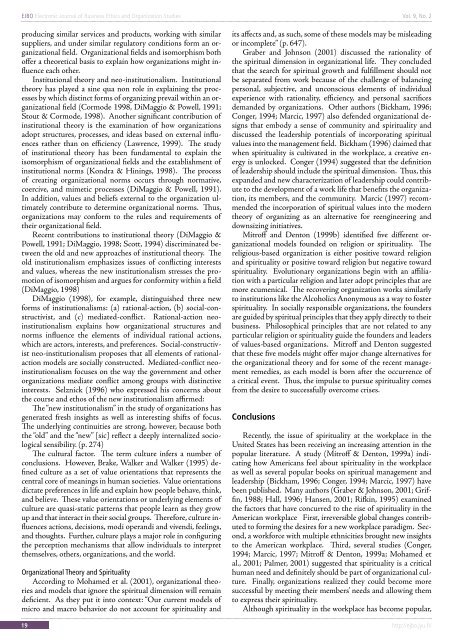The Gift of Spirituality
The Gift of Spirituality
The Gift of Spirituality
You also want an ePaper? Increase the reach of your titles
YUMPU automatically turns print PDFs into web optimized ePapers that Google loves.
EJBO Electronic Journal <strong>of</strong> Business Ethics and Organization Studies Vol. 9, No. 2<br />
<strong>The</strong> Place <strong>of</strong> <strong>Spirituality</strong> in<br />
Organizational <strong>The</strong>ory<br />
By: Arnaldo Oliveira<br />
OLIVEIRA@HAWAII.RR.COM<br />
Abstract<br />
<strong>Spirituality</strong> in the American workplace<br />
has been receiving increasing<br />
attention by the popular literature.<br />
However, the issue has received<br />
little consideration from management<br />
scholars. Although there are<br />
several definitions <strong>of</strong> spirituality,<br />
this paper discusses it as a cultural<br />
phenomenon that might influence<br />
organizational behavior. <strong>The</strong><br />
investigation <strong>of</strong> spirituality in the<br />
workplace demands the examination<br />
<strong>of</strong> organization theory and some <strong>of</strong><br />
its concepts. Open systems, institutional<br />
isomorphism, open fields, institutionalism,<br />
and neo-institutional<br />
theories are examined. <strong>Spirituality</strong><br />
should not be neglected as a legitimate<br />
organizational topic <strong>of</strong> study,<br />
and more research on the impact <strong>of</strong><br />
spirituality in the workplace should<br />
be conducted.<br />
Introduction<br />
<strong>The</strong> term spirituality infers a number<br />
<strong>of</strong> conclusions and may firmly imply some<br />
form <strong>of</strong> religious connotation. Several<br />
authors have <strong>of</strong>fered a variety <strong>of</strong> definitions<br />
<strong>of</strong> spirituality: Some with atheistic<br />
and materialistic constructions (Dehler<br />
& Welsh, 1994; Mitr<strong>of</strong>f & Denton,<br />
1999a; Ashmos & Duchon, 2000), and<br />
others with pantheistic and deistic visions<br />
(Benner, 1989; Mohamed, Hassan<br />
& Wisnieski, 2001). To Griffin (1988),<br />
for example, spirituality is an inherent<br />
human characteristic that does not intrinsically<br />
infer any religious meaning:<br />
<strong>Spirituality</strong> in this broad sense is not<br />
an optional quality which we might elect<br />
not to have. Everyone embodies a [sic]<br />
spirituality, even if it be a nihilistic or materialistic<br />
spirituality. It is also, <strong>of</strong> course,<br />
customary to use spirituality in a stricter<br />
sense for a way <strong>of</strong> life oriented around<br />
an ultimate meaning and around values<br />
other than power, pleasure, and possession.<br />
(pp. 1-2)<br />
According to Mitr<strong>of</strong>f and Denton,<br />
(1999a), spirituality is “the basic feeling <strong>of</strong><br />
being connected with one’s complete self,<br />
others, and the entire universe” (p.86).<br />
Dehler and Welsh (1994) defined spirituality<br />
as “a specific form <strong>of</strong> work feeling<br />
that energizes action” (p. 19). Ashmos<br />
and Duchon (2000) discussed spirituality<br />
in the context <strong>of</strong> community work, and<br />
Benner (1989) believed that spirituality<br />
involves the process <strong>of</strong> establishing and<br />
maintaining a relationship with God.<br />
Mohamed, Hassan, and Wisnieski<br />
(2001), highlighted the fact that several<br />
scholars (Harlos, 2000; Shafranske &<br />
Malony, 1990) defended the importance<br />
<strong>of</strong> defining the conceptual differences between<br />
spirituality and religiosity. Thus,<br />
in their view, spirituality may be personal,<br />
inclusive, and positive, whereas religiosity<br />
might be external, exclusive, and negative.<br />
Supporting the recommendation <strong>of</strong><br />
Mahamed et al., in a two-year empirical<br />
study based on both face-to-face interviews<br />
and survey questionnaires, Mitr<strong>of</strong>f<br />
and Denton (1999b) found that 60 percent<br />
<strong>of</strong> the participants viewed religion<br />
as an inappropriate form <strong>of</strong> expression,<br />
whereas spirituality was interpreted as<br />
a proper subject for the workplace. In<br />
addition, their research indicated that<br />
employees expect organizations to cultivate<br />
some type <strong>of</strong> spirituality within<br />
their members in order to produce high<br />
quality products and services. However,<br />
taking a different direction, Mohamed et<br />
al. claimed that the attempt to differentiate<br />
between spirituality and religiosity is<br />
merely artificial. As an alternative to this<br />
unnecessary dichotomy, they proposed<br />
that the concept <strong>of</strong> spirituality should<br />
be added to the five-factor psychological<br />
model <strong>of</strong> personality, the “Big Five,” as its<br />
sixth dimension. <strong>The</strong>ir justification, nevertheless,<br />
attempted to find support in<br />
the facts that the concept <strong>of</strong> spirituality<br />
is not in opposition to other well-established<br />
psychological constructs and that<br />
the Big Five has already been linked to<br />
job performance. Mohamed et al. also<br />
speculated that spirituality, managerial<br />
behavior and, job performance are,<br />
to some extent, interconnected, which<br />
could explain some <strong>of</strong> the variances in job<br />
performance that have not yet been elucidated<br />
by the Big Five.<br />
Although the literature has provided<br />
ample interpretations for spirituality, the<br />
definition used in this article, in a broad<br />
sense, refers to people’s values and meanings,<br />
which sometimes might incorporate<br />
religious beliefs as well. Further, this<br />
premise also infers that spirituality might<br />
carry strong cultural connotations.<br />
Discussion<br />
A New Paradigm<br />
In recent years, the place <strong>of</strong> spirituality<br />
in organizations has been increasingly<br />
considered by (a) managers, (b) executives,<br />
(c) employees, and (d) researchers<br />
to be essential to the organization's<br />
interactions with employees, customers,<br />
and the community (Ashmos & Duchon,<br />
2000; Conger, 1994; Dehler & Welsh,<br />
1994; Hansen, 2001). However, little<br />
attention has been paid in the literature<br />
to the investigation <strong>of</strong> spirituality as a<br />
cultural phenomenon that might influence<br />
organizational behavior and induce<br />
organizational change. <strong>The</strong>refore, few<br />
change models that embraced some sort<br />
<strong>of</strong> spiritual element (Senge, 1990; Covey,<br />
1989) became an alternative.<br />
17 http://ejbo.jyu.fi/

















